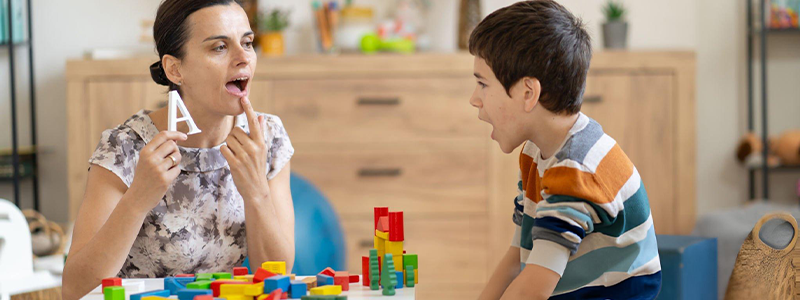Archives

Innovative Approaches to Addressing Speech Delays in Children
Introduction Speech delays in children can be a source of concern for parents, but with early intervention and the right therapeutic approaches, significant improvements can be made. This blog discusses innovative and holistic approaches that speech therapists use to address speech delays in children.
Causes of Speech Delays
Genetic Factors: Genetic predispositions can play a significant role in speech delays. Conditions like familial speech delay or specific genetic syndromes can affect speech development. If speech delays run in the family, a child may inherit these tendencies.
Bilingualism: Children growing up in bilingual environments might initially show speech delays as they navigate learning two languages simultaneously. A child exposed to both English and Spanish might take longer to start speaking but will eventually become proficient in both languages.
Psychosocial Factors: Emotional and social factors, including trauma, neglect, or significant changes in the child’s environment, can contribute to speech delays. A child who has experienced a traumatic event might develop selective mutism or have delayed speech as a coping mechanism.
Innovative Therapeutic Approaches
Play-Based Therapy: Integrating play into therapy sessions can make learning more natural and enjoyable for children. This method leverages the child’s natural inclination to play to encourage speech and language development. Using puppets, dolls, and interactive games, a therapist can create scenarios that prompt the child to use speech in a fun and engaging context.
Integrative Sensory Therapy: For children with sensory processing issues, incorporating sensory integration techniques can enhance speech therapy outcomes. This method addresses the sensory needs that may be hindering speech development. Activities that involve tactile stimulation, like playing with textured materials, can help children who have difficulty processing sensory information to better engage in speech therapy.
Music and Rhythm Therapy: Music and rhythm can be powerful tools in speech therapy. Singing, rhythmic chanting, and using musical instruments can improve auditory processing and speech production. A therapist might use simple songs and rhythmic patterns to help a child with speech delay practice timing, intonation, and articulation.
Family-Centered Therapy: Involving the entire family in the therapeutic process ensures that the child has a supportive environment for practicing new skills. Therapists work with parents and siblings to create a cohesive support system. Family therapy sessions might include group activities that promote communication, such as storytelling or family games that require verbal interaction.
How Speech Therapists Implement These Approaches
Initial Consultation and Custom Plan: The therapist conducts an initial consultation to understand the child’s specific needs and family dynamics, then crafts a custom plan that incorporates innovative approaches suited to the child. If a child responds well to music, the therapist might integrate more musical elements into the therapy sessions.
Regular Monitoring and Adjustments: Continuous monitoring of the child’s progress allows the therapist to make necessary adjustments to the therapy plan. Flexibility is key to addressing the evolving needs of the child. If a particular approach is not yielding the expected results, the therapist might try a different strategy, such as switching from play-based activities to more structured speech exercises.
Collaborative Efforts: Therapists often collaborate with other professionals, such as occupational therapists, psychologists, and educators, to provide a comprehensive approach to the child’s development. A child with sensory processing issues might benefit from sessions with both a speech therapist and an occupational therapist to address all aspects of their development.
Conclusion Addressing speech delays in children requires a multifaceted approach tailored to each child’s unique needs. Innovative methods such as play-based therapy, sensory integration, and family-centered practices offer effective ways to support speech development. With the right intervention, children with speech delays can achieve significant progress and improve their communication skills.


